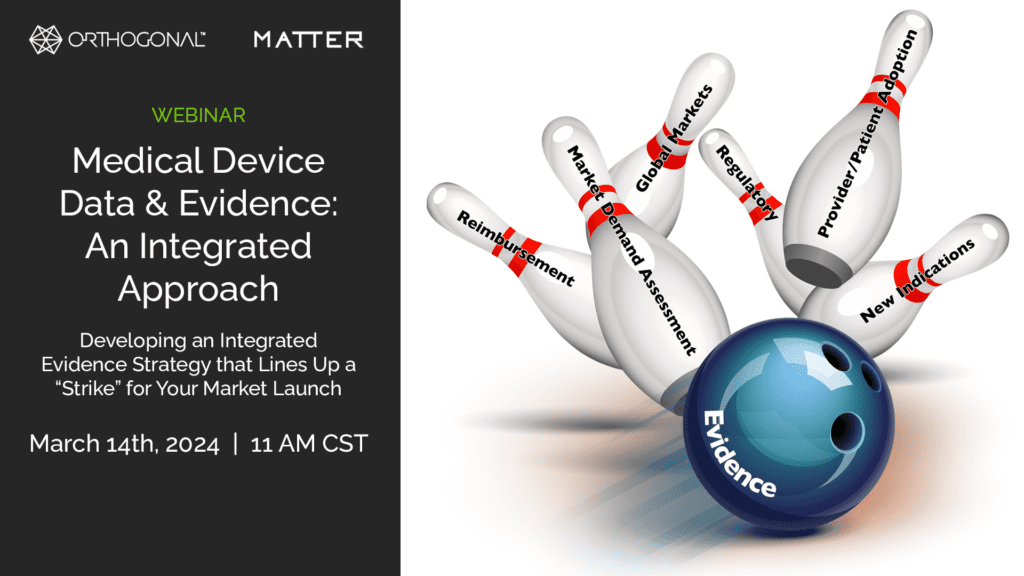
Talk
Leveraging Automation to Deliver High-Quality MedTech Software

One of the most formidable challenges in bringing a medical device to market is generating clinical and commercial evidence for a diverse group of stakeholders, such as the FDA, insurance payers and healthcare providers. It’s a complicated process where any misstep can lead to costly delays and a loss of profits.
Think of it like bowling, where the ball is your evidence and the pins are your stakeholders’ requirements. How do you knock down all ten pins on your first frame?
On March 14th, 2024, Orthogonal and MATTER Chicago held a webinar that brought together distinguished MedTech leaders to share insights, case studies and best practices for developing effective evidence gathering strategies.
1. Kwame, Christian and Jennifer are among the authors of a 2022 report from UCLA Biodesign looking at the current major roadblocks to market for MedTech manufacturers. Prior research into this subject in 2010 from Stanford Biodesign indicated that the FDA was the largest impediment to manufacturers, but a majority of people interviewed for the 2022 report think the FDA is now doing a far better job of responding with regulatory changes to address advancements in medical technology. Additionally, many regulators have left the FDA to work in the industry and share their knowledge, providing industry with more relevant experience and making the regulatory challenges to entry easier to surmount.
2. According to our speakers’ report, reimbursement is now regarded by leaders of medical device manufacturers as the biggest roadblock to getting successful devices to market in the U.S. Receiving approval for your device from the Centers for Medicare and Medicaid Services (CMS) requires making a case for its economic benefit; for instance, demonstrating that your product decreases overall healthcare costs or serves as a more cost-effective treatment than what’s already out on the market. Obtaining reimbursement is most difficult for De Novo products that do not fall into a pre-existing benefits category, as CMS has little capacity or leeway to expand coverage decisions. The situation is similar for private healthcare payers in the U.S.
3. Another other side to securing reimbursement is winning over hospitals and physicians. Hospitals review new technology as part of a Value Analysis Committee (VAC). Our speakers stress that a VAC is the last stop on the path towards getting MedTech products in the hospital. One proven best practice is teaming up with an internal “physician champion” who can help MedTech manufacturers increase the trustworthiness and attractiveness of their product for VACs.
4. When presenting to a VAC, consider answers to the following points:What is the long-term cost of ownership of your product?
5. An integrated approach to data is one way to manage the diverse needs of these different stakeholders, as well as help smooth the way to international markets. Your product’s data strategy should be defined as early as possible, when the cost of acquiring data is low and systems can be designed for that type of acquisition. As your product grows and receives funding, your pool of data can expand to cover activities like your FDA strategy or a health economics and outcomes research study.
Kwame Ulmer, Managing Partner, MedTech Impact Partners
Kwame Ulmer is a medtech executive with over two decades of experience leading and advising public and private sector organizations to improve compliance, interpret FDA policies, conduct M&A due diligence, and build impactful DE&I organizations.
Kwame currently serves as Managing Partner of MedTech Impact Partners, a regulatory strategy consulting firm, where he has grown the company by 89% CAGR and guided over fifty MedTech companies through FDA approval and improved their enterprise value. Kwame also serves as Venture Partner of Wavemaker Three-Sixty Health, an early stage venture capital firm with $84M AUM. Kwame leads the team in sourcing, diligence and support of MedTech and diagnostic companies.
He is a member of the board of Essenvia, Inc, the Lincoln University Foundation, California Life Sciences Board, and the University of Virginia Licensing & Ventures Group, where he also served on the search committee for its Executive Director. Kwame is a board observer of Strados Labs, Inc.
Christian Johnson, CEO and Founder, ScoutMedix, Strategic Development, Essenvia
Christian is a purpose-driven entrepreneur, advisor, and strategy consultant dedicated towards the advancement and commercialization of breakthrough medical technologies, diagnostics, and artificial intelligence enabled solutions. Over the last decade, Christian has led or supported market research, strategy, scouting, diligence, investment, or commercialization activities for over 250 medical devices and health technologies worldwide.
Currently, Christian is founder and CEO of ScoutMedix, a MedTech strategy, market research, and go-to-market advisory firm. He also leads strategic development at Essenvia – an innovative MedTech regulatory (RIM) platform – is an advisor at the Lundquist Institute for Biomedical Innovation, is an advisor at Saving Hearts Foundation, and is co-founder and Board Director at Seed Consulting Group.
Previously, Christian served as global vice president of product for a multinational in vitro diagnostic (IVD) company, He also was a Sr. Fellow at the UCLA Biodesign Hub where he co-led the landmark industry study “Interstates and Autobahns: Global MedTech Regulation in the Digital Age” in partnership with Boston Consulting Group. Before, Christian served in global strategy and marketing at Edwards Lifesciences. Finally, Christian is a member of Forbes Councils, a TEDx speaker, and recipient of “Best and Brightest” MBAs by Poets & Quants.
Jennifer McCaney, Co-Executive Director of UCLA Biodesign
Jennifer McCaney holds dual appointments at UCLA Anderson School of Management and the UCLA David Geffen School of Medicine, specializing in health care entrepreneurship and technology. She co-leads UCLA Biodesign, fostering leadership and entrepreneurship in health care technology. McCaney is experienced in early-stage company formation and technology development, particularly in digital health, medical devices, and diagnostics. As the founding director of the MedTech Innovator Accelerator, she collaborates with startup companies and industry leaders like Johnson & Johnson and Amgen. McCaney is also involved in UCLA Clinical and Translational Science Institute, supporting biomedical innovation and addressing health needs in diverse communities. She leads initiatives to develop the regional ecosystem for medical technology in Southern California. With a background in mechanical engineering and biomedical engineering, including a Ph.D. from Stanford University, McCaney brings a unique perspective to bridging technology and healthcare.
Bernhard Kappe, CEO and Founder, Orthogonal
Bernhard Kappe is the Founder and CEO of Orthogonal. For over a decade, Bernhard has provided thought leadership and innovation in the fields of Software as a Medical Device (SaMD), Digital Therapeutics (DTx) and connected medical device systems. As a leader in the MedTech industry, Bernhard has a passion for launching successful medical device software that makes a difference for providers and patients, as well as helping companies deliver more from their innovation pipelines. He’s the author of the eBook Agile in an FDA Regulated Environment and a co-author of the AAMI Consensus Report on cloud computing for medical devices. Bernhard was the founder of the Chicago Product Management Association (ChiPMA) and the Chicago Lean Startup Challenge. He earned a Bachelor’s and Masters in Mathematics from the University of Pennsylvania, and a Bachelor’s of Science and Economics from the Wharton School of Business.
Randy Horton, Chief Solutions Officer, Orthogonal
Randy Horton is Chief Solutions Officer at Orthogonal, a software consulting firm that improves patient outcomes faster by helping MedTech firms accelerate their development pipelines for Software as a Medical Device (SaMD), digital therapeutics (DTx) and connected medical device systems. Orthogonal makes that acceleration happen by fusing modern software engineering and product management tools and techniques (e.g., Agile, Lean Startup, User-Centered Design and Systems Thinking) with the regulated focus on device safety and effectiveness that is at the heart of MedTech.
Horton serves as Co-Chair for AAMI’s Cloud Computing Working Group, as well as AAMI CR:510(2021) and the in-process Technical Information Report #115, all of which address how to safely move medical device computing functions into the cloud. He is a frequent speaker at conferences and webinars, including events hosted by AdvaMed, AAMI, HLTH, RAPS and the Human Factors and Ergonomics Society (HFES).
Related Posts

Talk
Leveraging Automation to Deliver High-Quality MedTech Software

Talk
The Playbook for Running a Multi-Partner Engineering Organization

Talk
Bridging the Gap: SaMD Strategy for Teams Built on Hardware

Talk
FDA/CDRH Changes: How MedTech Companies Can Prepare Webinar Summary